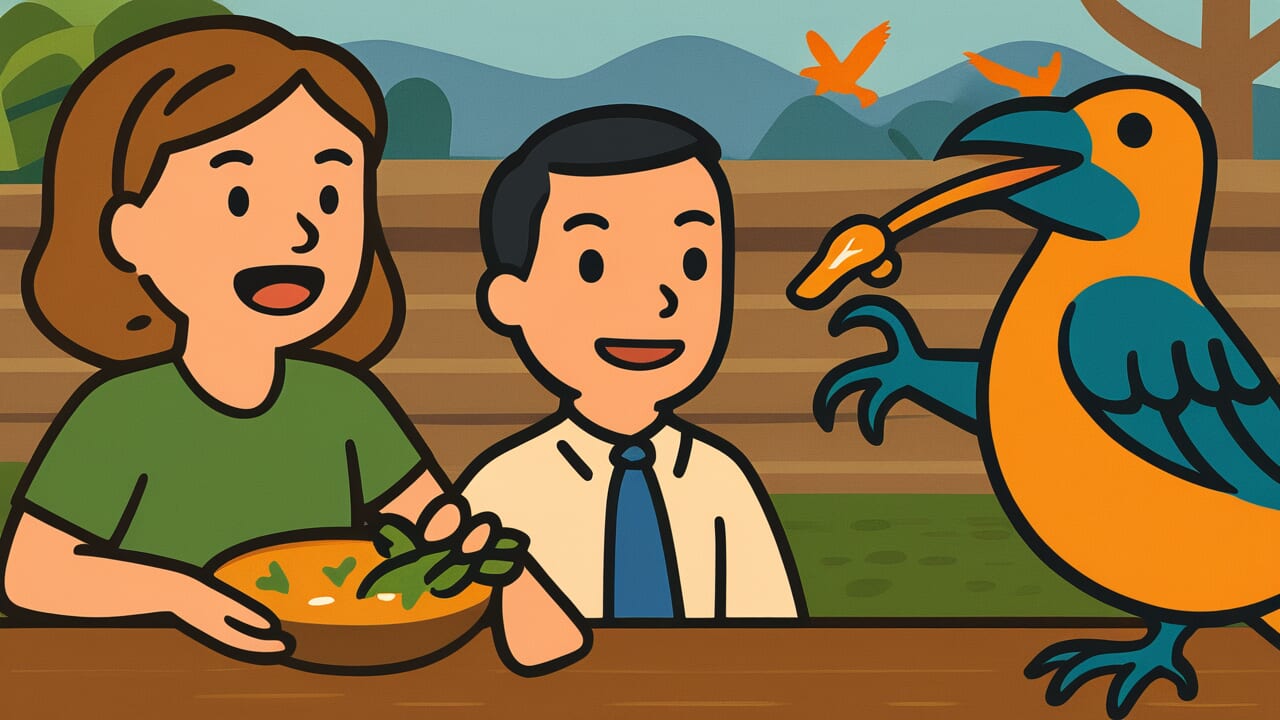How to Read “With that voice, does the cuckoo eat lizards?”
Ano koe de tokage kurau ka hototogisu
Meaning of “With that voice, does the cuckoo eat lizards?”
This proverb means that even birds with beautiful songs must eat insects to survive. It expresses the gap between outward appearance or surface impressions and actual reality.
People who seem elegant or act refined also do unglamorous things to get by in life. This is simply reality.
No matter how beautiful something appears, it still requires steady effort and sometimes hidden struggles to survive.
This proverb is used to warn against judging people only by their surface. It also points out gaps between ideals and reality.
People use it when reflecting on whether they’re putting on too much of a show themselves.
Even today, people who display glamorous lives on social media have invisible struggles behind the scenes. This teaching helps us understand the essential duality of human nature.
Origin and Etymology
No clear written records explain the origin of this proverb. However, it likely arose from observations of the cuckoo bird’s characteristics.
The cuckoo has been beloved by Japanese people since ancient times as a summer bird. Its beautiful, clear song appears in many poems in the Manyoshu and Kokin Wakashu collections.
The bird symbolized elegance and refinement. Its call sounds almost like spoken words, captivating people’s hearts.
Yet despite its graceful appearance, the cuckoo catches insects to survive like other birds. The word “lizard” here doesn’t necessarily mean actual lizards.
It likely refers to insects and small creatures in general.
This proverb emerged from observing the cuckoo. A bird with such a beautiful voice actually eats creatures that crawl on the ground.
This contrast captures the gap between outward impressions and actual living conditions. The proverb uses the concrete example of the cuckoo to express this truth.
It shows the sharp observation skills of Japanese people. It also reveals their wisdom in drawing insights about human society from nature.
Interesting Facts
The cuckoo is known for brood parasitism. It doesn’t build its own nest. Instead, it lays eggs in the nests of other birds like warblers.
This cunning survival strategy contrasts with the bird’s image as elegant and beautiful. This fact connects interestingly with the proverb’s meaning.
The Chinese characters for “lizard” combine characters meaning “stone” and “dragon.” In ancient China, people considered lizards relatives of dragons.
In Japan too, lizards have been viewed as familiar yet somewhat mysterious creatures throughout history.
Usage Examples
- That person looks refined, but “with that voice, does the cuckoo eat lizards?” – they actually live quite shrewdly
- I always act gracefully, but “with that voice, does the cuckoo eat lizards?” – behind the scenes, I’m working desperately too
Universal Wisdom
This proverb teaches us about the fundamental duality of human existence. We all live with two aspects: the face we show others and our actual daily life.
Why do people try to polish their surface appearance? Perhaps it’s an instinct of humans as social creatures.
The desire to be seen as beautiful, admirable, and respectable is natural. Yet to survive, we must face unglamorous reality.
We work to eat. Sometimes we must make choices far from our ideals. This contradiction is the truth of being human.
This proverb has been passed down because it captures this universal truth brilliantly. Through the concrete example of the cuckoo, it reflects human nature.
Even birds with beautiful songs must eat insects to live. This isn’t criticism. Rather, it affirms the essence of living.
Our ancestors didn’t view the gap between appearance and reality negatively. They had the wisdom to accept it as part of being human.
Even people who seem perfect are actually struggling to survive. Knowing this fact deepens our understanding of others.
At the same time, it allows us to forgive ourselves.
When AI Hears This
The human brain unconsciously prioritizes information when processing multiple sensory inputs simultaneously. This proverb captures the moment when that prioritization distorts judgment.
Research in acoustic psychology shows auditory information reaches the brain about 0.04 seconds faster than visual information.
When we hear the cuckoo’s beautiful song, our brain first forms impressions like “elegance” and “purity” from that sound.
Even when we later see it eating lizards, the already-formed auditory impression acts as a cognitive filter. This prevents us from properly evaluating the visual information.
This is called “cross-modal bias.”
More interesting is the fact that beautiful high-frequency sounds connect with images of “cleanliness” and “delicacy.”
Experiments show that impression evaluations change up to 40 percent depending on whether background sound is high or low pitched.
The cuckoo’s high, clear voice falls precisely in the frequency range that maximizes this psychological effect.
In other words, this proverb exploits a structural weakness in human cognitive systems. One sensory channel “acoustically masks” other information.
The beautiful voice as prior information continues to bias all subsequent judgments.
Lessons for Today
This proverb teaches modern people compassion for others and kindness toward themselves.
First, it warns against judging people by appearance or impressions alone. People who shine on social media may struggle invisibly.
Those who act gracefully may be working desperately behind the scenes. Before envying or criticizing based on surface appearances, we should imagine the whole picture.
At the same time, this proverb liberates us. If you’re trying too hard to appear perfect, you can relax a little.
Even the cuckoo with its beautiful song eats insects to survive. That’s not shameful. It’s the natural state of living.
You may struggle with the gap between your ideal self and your real self. But that gap is what makes you human.
Both the surface and the hidden parts together make you who you are. You don’t need to pretend to be perfect.
Have the courage to live proudly as your authentic self.



Comments